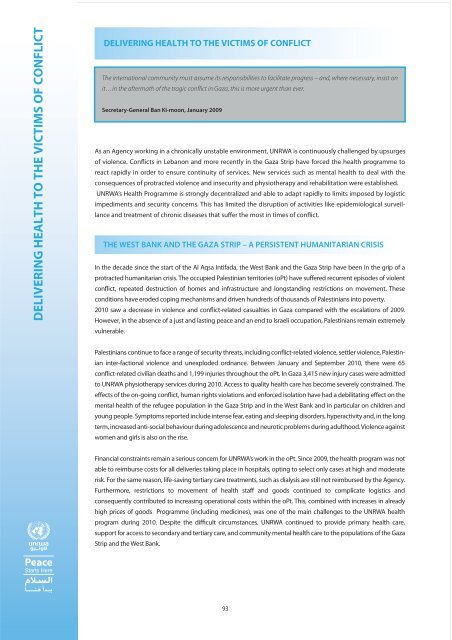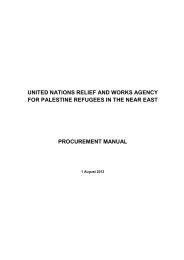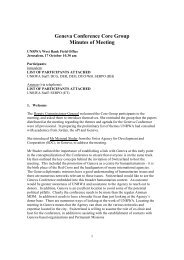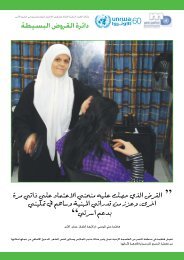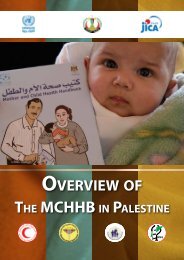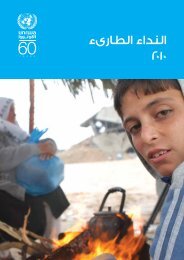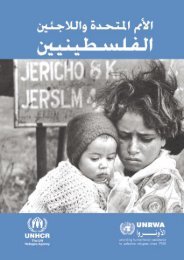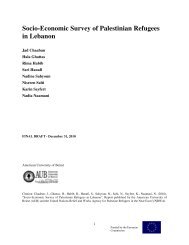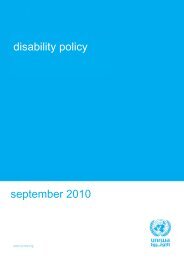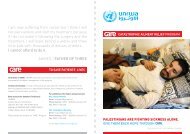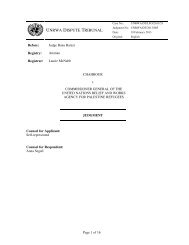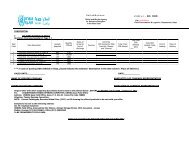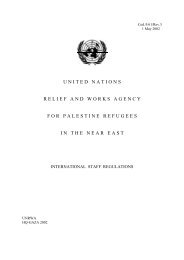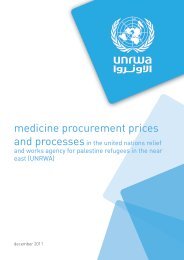Annual Report of the Department of Health 2010 - Unrwa
Annual Report of the Department of Health 2010 - Unrwa
Annual Report of the Department of Health 2010 - Unrwa
You also want an ePaper? Increase the reach of your titles
YUMPU automatically turns print PDFs into web optimized ePapers that Google loves.
DELIVERING HEALTH TO THE VICTIMS OF CONFLICT<br />
DELIVERING HEALTH TO THE VICTIMS OF CONFLICT<br />
The international community must assume its responsibilities to facilitate progress – and, where necessary, insist on<br />
it…in <strong>the</strong> aftermath <strong>of</strong> <strong>the</strong> tragic conflict in Gaza, this is more urgent than ever.<br />
Secretary-General Ban Ki-moon, January 2009<br />
As an Agency working in a chronically unstable environment, UNRWA is continuously challenged by upsurges<br />
<strong>of</strong> violence. Conflicts in Lebanon and more recently in <strong>the</strong> Gaza Strip have forced <strong>the</strong> health programme to<br />
react rapidly in order to ensure continuity <strong>of</strong> services. New services such as mental health to deal with <strong>the</strong><br />
consequences <strong>of</strong> protracted violence and insecurity and physio<strong>the</strong>rapy and rehabilitation were established.<br />
UNRWA’s <strong>Health</strong> Programme is strongly decentralized and able to adapt rapidly to limits imposed by logistic<br />
impediments and security concerns. This has limited <strong>the</strong> disruption <strong>of</strong> activities like epidemiological surveillance<br />
and treatment <strong>of</strong> chronic diseases that suffer <strong>the</strong> most in times <strong>of</strong> conflict.<br />
THE WEST BANK AND THE GAZA STRIP – A PERSISTENT HUMANITARIAN CRISIS<br />
In <strong>the</strong> decade since <strong>the</strong> start <strong>of</strong> <strong>the</strong> Al Aqsa Intifada, <strong>the</strong> West Bank and <strong>the</strong> Gaza Strip have been in <strong>the</strong> grip <strong>of</strong> a<br />
protracted humanitarian crisis. The occupied Palestinian territories (oPt) have suffered recurrent episodes <strong>of</strong> violent<br />
conflict, repeated destruction <strong>of</strong> homes and infrastructure and longstanding restrictions on movement. These<br />
conditions have eroded coping mechanisms and driven hundreds <strong>of</strong> thousands <strong>of</strong> Palestinians into poverty.<br />
<strong>2010</strong> saw a decrease in violence and conflict-related casualties in Gaza compared with <strong>the</strong> escalations <strong>of</strong> 2009.<br />
However, in <strong>the</strong> absence <strong>of</strong> a just and lasting peace and an end to Israeli occupation, Palestinians remain extremely<br />
vulnerable.<br />
Palestinians continue to face a range <strong>of</strong> security threats, including conflict-related violence, settler violence, Palestinian<br />
inter-factional violence and unexploded ordnance. Between January and September <strong>2010</strong>, <strong>the</strong>re were 65<br />
conflict-related civilian deaths and 1,199 injuries throughout <strong>the</strong> oPt. In Gaza 3,415 new injury cases were admitted<br />
to UNRWA physio<strong>the</strong>rapy services during <strong>2010</strong>. Access to quality health care has become severely constrained. The<br />
effects <strong>of</strong> <strong>the</strong> on-going conflict, human rights violations and enforced isolation have had a debilitating effect on <strong>the</strong><br />
mental health <strong>of</strong> <strong>the</strong> refugee population in <strong>the</strong> Gaza Strip and in <strong>the</strong> West Bank and in particular on children and<br />
young people. Symptoms reported include intense fear, eating and sleeping disorders, hyperactivity and, in <strong>the</strong> long<br />
term, increased anti-social behaviour during adolescence and neurotic problems during adulthood. Violence against<br />
women and girls is also on <strong>the</strong> rise.<br />
Financial constraints remain a serious concern for UNRWA’s work in <strong>the</strong> oPt. Since 2009, <strong>the</strong> health program was not<br />
able to reimburse costs for all deliveries taking place in hospitals, opting to select only cases at high and moderate<br />
risk. For <strong>the</strong> same reason, life-saving tertiary care treatments, such as dialysis are still not reimbursed by <strong>the</strong> Agency.<br />
Fur<strong>the</strong>rmore, restrictions to movement <strong>of</strong> health staff and goods continued to complicate logistics and<br />
consequently contributed to increasing operational costs within <strong>the</strong> oPt. This, combined with increases in already<br />
high prices <strong>of</strong> goods Programme (including medicines), was one <strong>of</strong> <strong>the</strong> main challenges to <strong>the</strong> UNRWA health<br />
program during <strong>2010</strong>. Despite <strong>the</strong> difficult circumstances, UNRWA continued to provide primary health care,<br />
support for access to secondary and tertiary care, and community mental health care to <strong>the</strong> populations <strong>of</strong> <strong>the</strong> Gaza<br />
Strip and <strong>the</strong> West Bank.<br />
93


